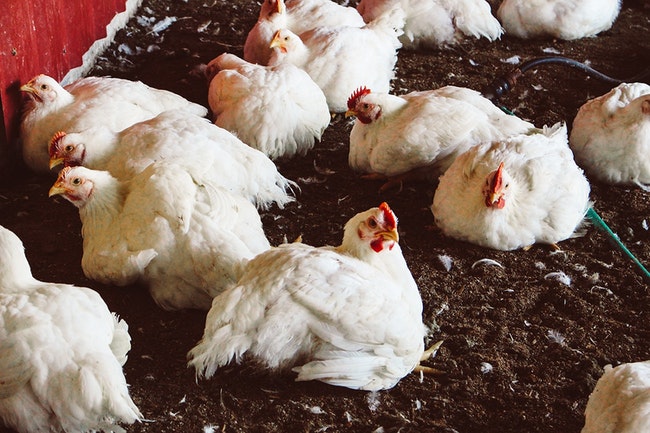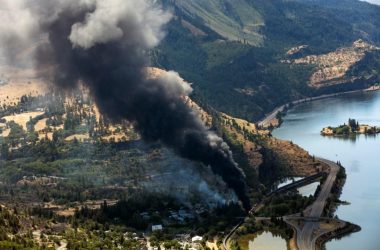
State legislators are digging into issues around commercial chicken operations that have stirred neighbor opposition. (Oregon Department of Agriculture)
State lawmakers, environmentalists and supporters and opponents of industrial chicken farms will meet this summer to consider whether Oregon’s laws to protect residents, wildlife, groundwater and waterways from any harm from large-scale poultry operations.
The work group holds its first meeting on Thursday and will hold four other sessions through Sept. 20. Each will be devoted to one topic. The first will focus on water and air quality. The group will also consider land use and hold a session for public comment.
Sen. Jeff Golden, D-Ashland, convened the group following the recent approval by the Oregon Department of Agriculture and the Department of Environmental Quality of an industrial chicken farm in Scio, southeast of Salem. That operation, which the owner plans to start building this summer, will produce 3.4 million chickens a year in 11 barns on a 60-acre plot in Scio. The operation has sparked opposition from local residents and environmental groups, which prompted Golden to convene the work group.
“I’m concerned about the number of people I’ve heard from, and the assertions I’ve heard concern me a lot,” Golden said. “I’ve heard from people who are really concerned about fish runs, and there is testimony about troublesome levels of ammonia coming from these hen houses.”
Golden will not participate in the group. Sen. Michael Dembrow, D-Portland, will chair it. Dembow said he just became aware of the issue as the February legislative session was ending in February.
“We’re hearing conflicting stories about the impacts from the owners as well as the neighbors,” Dembrow said. “Basically, these are considered agricultural operations and so they can go in agricultural land even though, to be honest, when land-use laws were first created we weren’t really thinking about operations like this being located in prime farmland.”
He’s especially interested in pressures on the local water supply.
“They will need substantial water. We’re talking about millions of birds,” Dembrow said.
“We need to really understand how they’re getting the water because my sense is the water rights for that area are already taking up so are they using what’s called what’s called the stock water exemption which allows people to use water to feed their animals,” he said.
He’s approaching the group with an open mind and has invited all sides to the table.
I’ve heard from people who are really concerned about fish runs, and there is testimony about troublesome levels of ammonia coming from these hen houses.
– State Sen. Jeff Golden, D-Ashland
Environmentalists, including WaterWatch of Oregon, worry that ammonia from the plant could pollute the nearby North Santiam River, home to endangered and threatened species of Chinook salmon and steelhead. Enclosed chicken operations produce a lot of ammonia, an odorous, corrosive gas that is blown out of poultry barns to avoid suffocating the birds. Environmentalists say it can travel up to 6 miles. The North Santiam River is only a quarter of a mile away.Opponents also fear the farm, J-S Ranch, which is owned by Eric Simon, will pollute groundwater. Many residents in the area rely on wells.
Simon said the chicken waste won’t taint the water. He said it is dry, and that he will collect it for sale as a soil enrichment additive. He said operations like his feed thousands. His operation will raise the birds for Foster Farms, which will truck chicks in and take birds out for slaughter in Kelso, Washington. Foster Farms, which was just bought by a holding company, is the main chicken producer in the West.
Two other Foster Farms operations – in Marion and Linn counties – are going through the permitting process. Opponents say the sale of Foster Farms to a large company with varied holdings is likely to prompt more proposals.
Golden said this is a good time to look at Oregon’s laws and consider whether they’re adequate.
“I sense that the national industry is turning its attention more to Oregon than it has in the past,” Golden said.
Both sides will be represented in the work group. Supporters include Simon and Bill Mattos, president of the Northwest Chicken Council. Opponents include Brian Posewitz, staff attorney of WaterWatch, and Kendra Kimbirauskas, owner of Shimanek Bridge Farm in Scio.
Sen. Michael Dembrow, D-Portland, will chair the group and four other lawmakers – Sen. Deb Patterson, D-Salem; Sen. Lynn Findley, R-Vale; Rep. Jamie Cate, R-Lebanon; and Rep. Zach Hudson, D-Troutdale – will take part. Golder will not take part in the sessions.
Two county commissioners – Casey Kulla of Yamhill County and Roger Nyquist of Linn County – will also take part.
The Oregon Agriculture Department will play a key role in providing information along with DEQ, Golden said.
The goal is to listen and learn – not craft policy, he said.
“We’re not asking this group to propose a bill,” Golden said. But lawmakers might use what they’ve learned to propose legislation in the 2023 session, he said.
Oregon Capital Chronicle is part of States Newsroom, a network of news bureaus supported by grants and a coalition of donors as a 501c(3) public charity. Oregon Capital Chronicle maintains editorial independence. Contact Editor Lynne Terry for questions: [email protected]. Follow Oregon Capital Chronicle on Facebook and Twitter.









